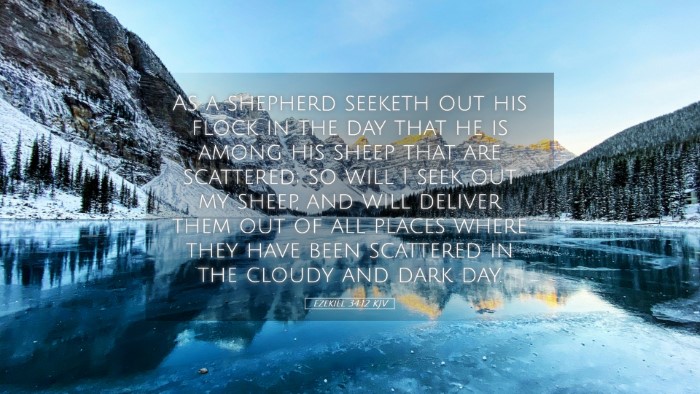Ezekiel 34:12 Commentary
Verse: "As a shepherd seeks out his flock on the day when he is among his sheep that have been scattered, so will I seek out my sheep, and I will rescue them from all places where they have been scattered on a day of clouds and thick darkness."
Introduction
The profound imagery of shepherding resonates throughout the Bible, portraying the role of God's chosen leaders over His people and underscoring God's personal commitment to His flock. Ezekiel 34:12 encapsulates this theme, highlighting both the diligence of a shepherd and the compassionate benevolence of God as the ultimate shepherd of His people. This commentary synthesizes insights from various public domain sources to provide a comprehensive understanding of this verse.
General Context
The chapter of Ezekiel 34 stands as a critical discourse on leadership, where God expresses His dissatisfaction with the current shepherds—Israel’s leaders—who have failed in their duties toward the people. This context is crucial in interpreting God's promise to take on the role of shepherd Himself, demonstrating His proactive care and intervention.
Exegesis of Ezekiel 34:12
- Shepherd Imagery: The role of a shepherd is foundational in the verse. As Matthew Henry indicates, the shepherd's primary responsibility is to gather his scattered sheep, which reflects God’s vigilant care for His people.
- Seeking Out the Lost: The act of “seeking out” emphasizes God's initiative in recovery and restoration. Albert Barnes draws attention to the desperation of the scattered sheep, reminding readers of the perilous nature of their situation.
- Day of Clouds and Thick Darkness: This phrase symbolizes confusion, danger, and distress. Adam Clarke contemplates the spiritual implications of darkness and how it represents the absence of divine guidance, which the people experienced.
Theological Implications
The Character of God: This verse profoundly reveals the compassionate nature of God. He is depicted as not only a concerned overseer but as an active rescuer. Theologically, it affirms the notion that God cares deeply for His people, seeking to restore them from their misguided paths.
Jesus as the Good Shepherd: In the Christian tradition, this scripture finds its ultimate fulfillment in Jesus Christ, who identifies Himself as the Good Shepherd (John 10:11). Both Matthew Henry and Albert Barnes emphasize how Christ embodies the qualities of the shepherd described in Ezekiel, demonstrating the commitment to seek and save the lost.
Pastoral Applications
- Leadership Responsibility: Pastors and church leaders can take from this verse a clear mandate to shepherd their congregations effectively, ensuring that no one is left lost or neglected.
- Outreach to the Scattered: The calling to seek those who stray is a reminder of the church's responsibility in outreach missions, reinforcing the importance of community and connection in a world often overshadowed by darkness.
- Encouragement for the Broken: This verse offers hope to believers who find themselves in positions of despair, assuring them of God’s relentless pursuit of their hearts and souls.
Conclusion
Ezekiel 34:12 serves as a beacon of hope and a reminder of the serious responsibility of leadership within the faith community. Drawing from the rich commentary of public domain sources, it becomes clear that God's relentless pursuit of His people is central to His character. For pastors, theologians, and students alike, embracing the depth of this verse enriches understanding and spurs action toward fulfilling the Great Commission of seeking the lost and ministering to those in need.


